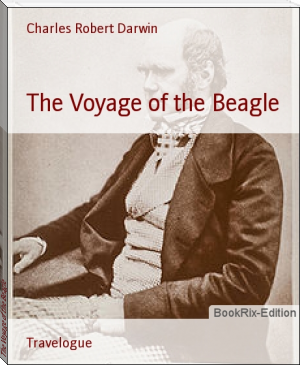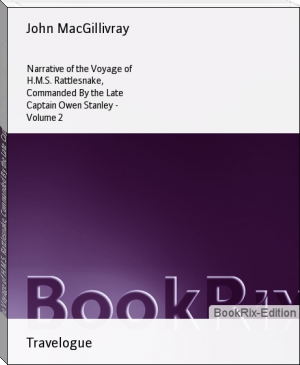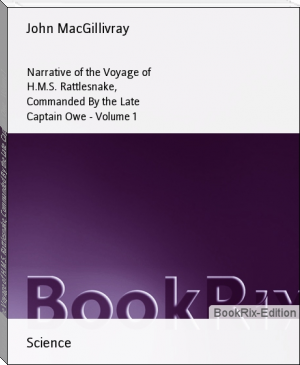The Voyage of the Beagle - Charles Robert Darwin (ebook reader for pc TXT) 📗

- Author: Charles Robert Darwin
Book online «The Voyage of the Beagle - Charles Robert Darwin (ebook reader for pc TXT) 📗». Author Charles Robert Darwin
seeing the present state, it is impossible not to look forward with high expectations to the future progress of nearly an entire hemisphere. The march of improvement, consequent on the introduction of Christianity throughout the South Sea, probably stands by itself in the records of history. It is the more striking when we remember that only sixty years since, Cook, whose excellent judgment none will dispute, could foresee no prospect of a change. Yet these changes have now been effected by the philanthropic spirit of the British nation.
In the same quarter of the globe Australia is rising, or indeed may be said to have risen, into a grand centre of civilization, which, at some not very remote period, will rule as empress over the southern hemisphere. It is impossible for an Englishman to behold these distant colonies, without a high pride and satisfaction. To hoist the British flag, seems to draw with it as a certain consequence, wealth, prosperity, and civilization.
In conclusion, it appears to me that nothing can be more improving to a young naturalist, than a journey in distant countries. It both sharpens, and partly allays that want and craving, which, as Sir J. Herschel remarks, a man experiences although every corporeal sense be fully satisfied. The excitement from the novelty of objects, and the chance of success, stimulate him to increased activity. Moreover, as a number of isolated facts soon become uninteresting, the habit of comparison leads to generalization. On the other hand, as the traveller stays but a short time in each place, his descriptions must generally consist of mere sketches, instead of detailed observations. Hence arises, as I have found to my cost, a constant tendency to fill up the wide gaps of knowledge, by inaccurate and superficial hypotheses.
But I have too deeply enjoyed the voyage, not to recommend any naturalist, although he must not expect to be so fortunate in his companions as I have been, to take all chances, and to start, on travels by land if possible, if otherwise, on a long voyage. He may feel assured, he will meet with no difficulties or dangers, excepting in rare cases, nearly so bad as he beforehand anticipates. In a moral point of view, the effect ought to be, to teach him good-humoured patience, freedom from selfishness, the habit of acting for himself, and of making the best of every occurrence. In short, he ought to partake of the characteristic qualities of most sailors. Travelling ought also to teach him distrust; but at the same time he will discover, how many truly kind-hearted people there are, with whom he never before had, or ever again will have any further communication, who yet are ready to offer him the most disinterested assistance.
[1] After the volumes of eloquence which have poured forth on this subject, it is dangerous even to mention the tomb. A modern traveller, in twelve lines, burdens the poor little island with the following titles, -- it is a grave, tomb, pyramid, cemetery, sepulchre, catacomb, sarcophagus, minaret, and mausoleum!
[2] It deserves notice, that all the many specimens of this shell found by me in one spot, differ as a marked variety, from another set of specimens procured from a different spot.
[3] Beatson's St. Helena. Introductory chapter, p. 4.
[4] Among these few insects, I was surprised to find a small Aphodius (nov. spec.) and an Oryctes, both extremely numerous under dung. When the island was discovered it certainly possessed no quadruped, excepting perhaps a mouse: it becomes, therefore, a difficult point to ascertain, whether these stercovorous insects have since been imported by accident, or if aborigines, on what food they formerly subsisted. On the banks of the Plata, where, from the vast number of cattle and horses, the fine plains of turf are richly manured, it is vain to seek the many kinds of dung-feeding beetles, which occur so abundantly in Europe. I observed only an Oryctes (the insects of this genus in Europe generally feed on decayed vegetable matter) and two species of Phanaeus, common in such situations. On the opposite side of the Cordillera in Chiloe, another species of Phanaeus is exceedingly abundant, and it buries the dung of the cattle in large earthen balls beneath the ground. There is reason to believe that the genus Phanaeus, before the introduction of cattle, acted as scavengers to man. In Europe, beetles, which find support in the matter which has already contributed towards the life of other and larger animals, are so numerous that there must be considerably more than one hundred different species. Considering this, and observing what a quantity of food of this kind is lost on the plains of La Plata, I imagined I saw an instance where man had disturbed that chain, by which so many animals are linked together in their native country. In Van Diemen's Land, however, I found four species of Onthophagus, two of Aphodius, and one of a third genus, very abundantly under the dung of cows; yet these latter animals had been then introduced only thirty-three years. Previous to that time the kangaroo and some other small animals were the only quadrupeds; and their dung is of a very different quality from that of their successors introduced by man. In England the greater number of stercovorous beetles are confined in their appetites; that is, they do not depend indifferently on any quadruped for the means of subsistence. The change, therefore, in habits which must have taken place in Van Diemen's Land is highly remarkable. I am indebted to the Rev. F. W. Hope, who, I hope, will permit me to call him my master in Entomology, for giving me the names of the foregoing insects.
Imprint
In the same quarter of the globe Australia is rising, or indeed may be said to have risen, into a grand centre of civilization, which, at some not very remote period, will rule as empress over the southern hemisphere. It is impossible for an Englishman to behold these distant colonies, without a high pride and satisfaction. To hoist the British flag, seems to draw with it as a certain consequence, wealth, prosperity, and civilization.
In conclusion, it appears to me that nothing can be more improving to a young naturalist, than a journey in distant countries. It both sharpens, and partly allays that want and craving, which, as Sir J. Herschel remarks, a man experiences although every corporeal sense be fully satisfied. The excitement from the novelty of objects, and the chance of success, stimulate him to increased activity. Moreover, as a number of isolated facts soon become uninteresting, the habit of comparison leads to generalization. On the other hand, as the traveller stays but a short time in each place, his descriptions must generally consist of mere sketches, instead of detailed observations. Hence arises, as I have found to my cost, a constant tendency to fill up the wide gaps of knowledge, by inaccurate and superficial hypotheses.
But I have too deeply enjoyed the voyage, not to recommend any naturalist, although he must not expect to be so fortunate in his companions as I have been, to take all chances, and to start, on travels by land if possible, if otherwise, on a long voyage. He may feel assured, he will meet with no difficulties or dangers, excepting in rare cases, nearly so bad as he beforehand anticipates. In a moral point of view, the effect ought to be, to teach him good-humoured patience, freedom from selfishness, the habit of acting for himself, and of making the best of every occurrence. In short, he ought to partake of the characteristic qualities of most sailors. Travelling ought also to teach him distrust; but at the same time he will discover, how many truly kind-hearted people there are, with whom he never before had, or ever again will have any further communication, who yet are ready to offer him the most disinterested assistance.
[1] After the volumes of eloquence which have poured forth on this subject, it is dangerous even to mention the tomb. A modern traveller, in twelve lines, burdens the poor little island with the following titles, -- it is a grave, tomb, pyramid, cemetery, sepulchre, catacomb, sarcophagus, minaret, and mausoleum!
[2] It deserves notice, that all the many specimens of this shell found by me in one spot, differ as a marked variety, from another set of specimens procured from a different spot.
[3] Beatson's St. Helena. Introductory chapter, p. 4.
[4] Among these few insects, I was surprised to find a small Aphodius (nov. spec.) and an Oryctes, both extremely numerous under dung. When the island was discovered it certainly possessed no quadruped, excepting perhaps a mouse: it becomes, therefore, a difficult point to ascertain, whether these stercovorous insects have since been imported by accident, or if aborigines, on what food they formerly subsisted. On the banks of the Plata, where, from the vast number of cattle and horses, the fine plains of turf are richly manured, it is vain to seek the many kinds of dung-feeding beetles, which occur so abundantly in Europe. I observed only an Oryctes (the insects of this genus in Europe generally feed on decayed vegetable matter) and two species of Phanaeus, common in such situations. On the opposite side of the Cordillera in Chiloe, another species of Phanaeus is exceedingly abundant, and it buries the dung of the cattle in large earthen balls beneath the ground. There is reason to believe that the genus Phanaeus, before the introduction of cattle, acted as scavengers to man. In Europe, beetles, which find support in the matter which has already contributed towards the life of other and larger animals, are so numerous that there must be considerably more than one hundred different species. Considering this, and observing what a quantity of food of this kind is lost on the plains of La Plata, I imagined I saw an instance where man had disturbed that chain, by which so many animals are linked together in their native country. In Van Diemen's Land, however, I found four species of Onthophagus, two of Aphodius, and one of a third genus, very abundantly under the dung of cows; yet these latter animals had been then introduced only thirty-three years. Previous to that time the kangaroo and some other small animals were the only quadrupeds; and their dung is of a very different quality from that of their successors introduced by man. In England the greater number of stercovorous beetles are confined in their appetites; that is, they do not depend indifferently on any quadruped for the means of subsistence. The change, therefore, in habits which must have taken place in Van Diemen's Land is highly remarkable. I am indebted to the Rev. F. W. Hope, who, I hope, will permit me to call him my master in Entomology, for giving me the names of the foregoing insects.
Imprint
Publication Date: 12-15-2009
All Rights Reserved
Free e-book «The Voyage of the Beagle - Charles Robert Darwin (ebook reader for pc TXT) 📗» - read online now
Similar e-books:





Comments (0)